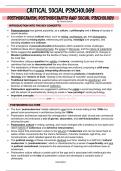By: Martin Roiser
INTRODUCTION INTO THE KEY CONCEPTS
• Postmodernism has gained popularity, as a culture, a philosophy and a theory of society in
recent decades.
• It is evident in various cultural areas, such as writing, architecture, art, and photography,
characterized by mixing styles, referencing and quoting, nostalgia over progress, and
blending creation and criticism.
• The emergence of post-structuralist philosophies within academic circles challenges
traditional ideas about interpreting texts, the power of discourse, and the nature of subjectivity.
• Some suggest that postmodernity has replaced the modern period, attributed to changes in
Western political economy like the decline of heavy industry, media growth, and the end of
the Cold War.
• Postmodern critiques question the validity of science, considering it just one of many
narratives that can be deconstructed like any other discourse.
• The implications of these ideas for social psychology are profound, proposing a shift away
from individual focus towards interpreting discourse and text.
• The history and methodology of psychology are viewed as products of modernism's
ideology and 'rhetoric of truth,' leading to the dismissal of 'scientific' social psychology.
• Traditional techniques like questionnaires and experiments should be abandoned, and
attempts to establish coherent theoretical frameworks (behaviourist, cognitive, psychoanalytic,
feminist, or Marxist) are considered ineffective.
• Postmodern approaches are suggested to address the crisis in social psychology and align
with the advent of postmodernity, aiming to create a 'new paradigm' social psychology.
• Important concepts: structuralism/poststructuralism, modernism/postmodernism,
natural science/social science and the “rhetoric of truth”.
POSTMODERN CULTURE
• The term 'postmodernism' initially referred to new forms of novel writing in the 1950s but
gained more prominence in architecture during the 1960s.
• Postmodern architecture rejected the unimaginative 'international style' of post-war commercial
architecture and embraced a mix of genres, decoration, and anti-functionalism, consciously
echoing the past.
• Postmodern culture in writing, painting, and music emerged with a tendency to mix styles and
reject notions of coherence and definitive interpretation.
• Some argue that postmodern culture is the tail-end of modernism and can be traced back to
earlier artistic movements like the Vienna Secession, Futurists, Dadaists, Agit-Prop, and
Constructivists, which rebelled against the old art and social orders.
• The political energy of these movements declined over time, leading to a shift from 'cultural
modernism' to 'postmodernism,' which is characterized by a sense of superficiality and lack
of political commitment compared to the seriousness of meaning and commitment seen in
modernism.
• Postmodern culture reflects a certain spirit of the age and is associated with intellectuals who
have contributed to the idea of postmodern culture and developed a complex body of
philosophy.
TJW NOTES
, POST-STRUCTURALIST PHILOSOPHY
• The ideas of post-structuralism can be traced back to Saussure's linguistics in the early
20th century, which were further developed by structuralists in the 1950s and 1960s,
incorporating contributions from Marx and Freud.
• These ideas evolved in the 1970s and 1980s, forming a loosely knit body of thought known
as post-structuralism.
• Post-structuralism has gained considerable popularity in universities, leading to the
proliferation of courses in cultural and media studies and social sciences that heavily rely
on these ideas.
• Literary criticism, especially in the US, has also been significantly influenced by post-
structuralist concepts.
• The body of ideas within post-structuralism is complex and can be subdivided into several
related philosophical strands.
• One of these strands focuses on language, text, and meaning, originating from Ferdinand de
Saussure's semiology (science of signs) outlined in his "Course in General Linguistics"
(1916, 1974).
• Saussure's concepts of 'signifier' (words), 'signified' (concepts and images), and 'referent'
(objects in the world) remain influential.
• In his model, signs combine into systems with structured meanings.
STRUCTURALISM
Saussure: signifier + signified = sign
⇒ Arbitrary relationship between signifier (word) and signified
(object)
⇒ Sign systems create meaning.
⇒ BUT that meaning is arbitrary and unstable.
• Anthropologists like Levi-Strauss, not social psychologists, embraced Saussure's ideas in the
1960s.
• In the 1970s and 1980s, post-structuralists, including Derrida, sought to dismantle the rigid
systems of structuralism through 'deconstruction,' which continuously disassembles and
reassembles meaning.
• Post-structuralists rejected the idea of fixed meanings and argued that there is no underlying
structure to meaning or society, allowing for indefinite reinterpretation of texts.
• No interpretation, not even that of the original author, is considered privileged; meaning is
seen as relative (virtual, comparative), and the notion of objective reality is de-emphasized.
• Foucault introduced the concept of 'power' into the discussion, emphasizing its presence in
discourses that define relationships between competing groups.
• Dominant discourses become instruments of influence, replacing physical power or property
ownership.
• Foucault's works, like "Discipline and Punish" and "Madness and Civilization," criticize the
liberal aspects of capitalist society and the role of reason in the age of enlightenment, giving
more importance to discourse than historical accuracy.
• The medieval tradition of the 'ship of fools,' used to confine the mentally ill, serves as an
example of a construct existing solely in discourse, lacking concrete evidence.
• shaping discourses. The works of Foucault are mentioned, highlighting how discourse shapes
perceptions and realities, even if lacking historical accuracy.
TJW NOTES





